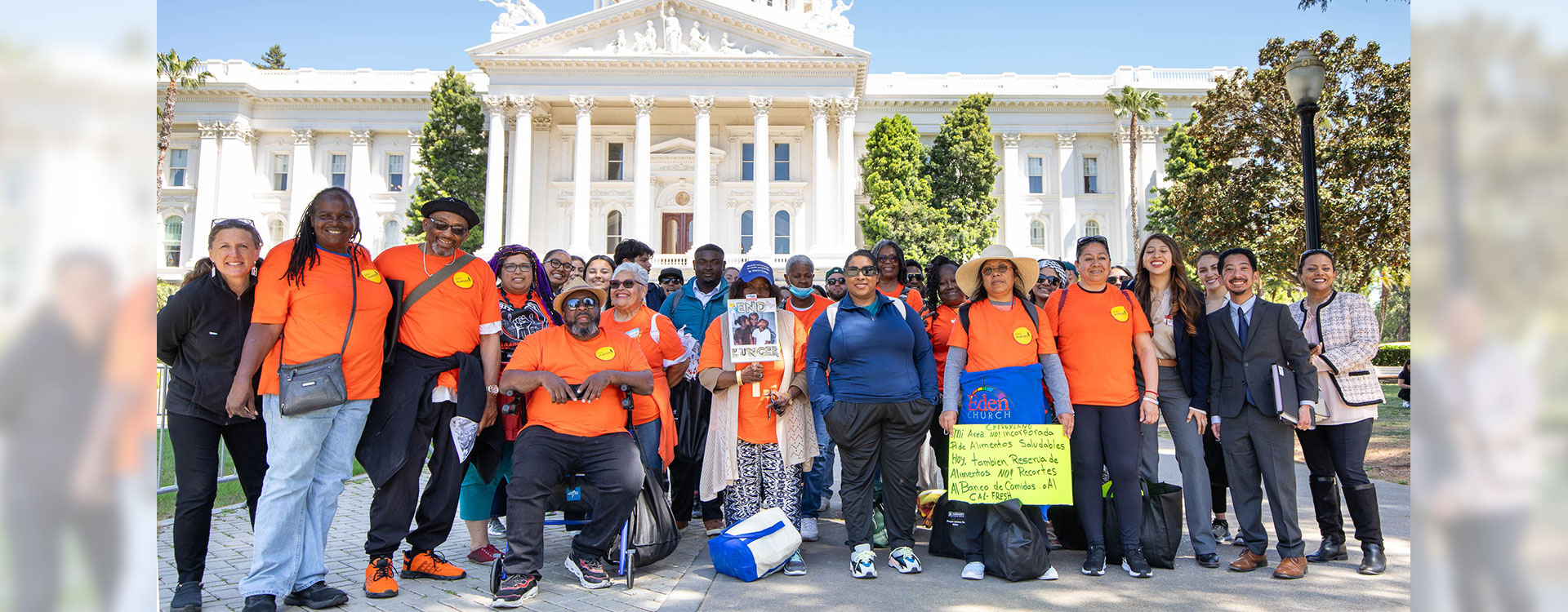2025 Policy Agenda
Alameda County Community Food Bank is committed to creating a healthy and prosperous community.
We believe solving hunger means meeting the immediate needs of our community while also working toward long-term solutions that ensure food and economic security for all—and putting an end to hunger for good.
Our annual policy agenda is set to seek meaningful legislation at all levels of government that address both immediate and long-term solutions to hunger, and is rooted in these basic principles:
- Hunger is a complex issue. In Alameda County, 1 in 4 community members are experiencing hunger. And in a nation as prosperous as ours, hunger doesn’t exist because there isn’t enough food; it exists because of systems of oppression that concentrate power and resources based on race, gender, sexuality, class, age, disability, and more, and create inequities at hunger and poverty’s roots.
- While people from all backgrounds experience hunger, we must also acknowledge that in Alameda County, 7 in 10 people in poverty are people of color. We are responding to at least an 11% increase in need from 2023 to 2024. This year, we expect there to be an even greater need – for an estimated 60 million pounds of food distributed.
- When we center the voices of people experiencing hunger, we learn that it is inseparable from other pressing issues such as healthcare and childcare. In particular, housing instability and the skyrocketing cost of living and rental burdens are squeezing peoples’ already tight budgets, further driving hunger. Community members and our partners are clear: we cannot tackle food insecurity without addressing housing and houselessness, and ACCFB is actively exploring legislative pathways towards housing justice.
- Essential nutrition programs that food banks are commonly known for are just one piece of a puzzle that includes the need for housing, democracy and voting rights, tax policy, immigrant inclusion in safety net programs, and more.
This is why, for more than 20 years, we have made advocating for policies that eliminate the causes of hunger as core to our mission as the food in our warehouse and the fuel in our delivery trucks.
Our Theory of Change is to trust and center most impacted people by activating three levers: building community power, holding government accountable, and transforming systemic hunger-poverty-racism. As we fight for these policies, one thing is certain: The movement is most powerful with you in it. Sign up for Advocacy Action Alerts or contact advocate@accfb.org for more information. We also invite you to reach out with your questions about our policy priorities. Please note that this living document will be updated throughout the year.
Issues & Policy Priorities
AGRICULTURE, ENVIRONMENTAL JUSTICE & SUSTAINABILITY
Federal
Federal Commodity Purchasing: Redirect the government’s considerable purchasing power toward a more equitable food distribution system that supports BIPOC farmers, producers, and distributors while engaging input from community members with lived experience with systemic inequities.
State
AB 337 (Bennett): Expand Department of Resources Recycling and Recovery’s grant program to provide financial assistance for the recovery of edible food and develop, implement, or expand edible food waste recovery operations.
AB 524 (Wilson): Create a program at the Department of Conservation to increase access to land for beginning and underserved farmers, especially BIPOC and indigenous farmers.
AB 937 (Connolly): Establish the Organic Transition Program to award grants to nonprofit organizations that would provide incentives to farmers and ranchers to transition land to certified organic production. Would also authorize CDFA to provide funding for the preparation and implementation of conservation management plans for organic transition.
SB 279 (McNerney): Increase community, on-farm, and food scrap composting capacity.
CalFresh/SNAP
Federal
End the prohibition on using SNAP benefits to purchase hot and prepared foods.
Parity in Food Assistance for U.S. Territories: Provide a pathway to help Puerto Rico, American Samoa, and the Commonwealth of the Northern Mariana Islands transition from the block-granted Nutrition Assistance Program (NAP) to full participation in SNAP.
Repeal the SNAP Drug Felony Ban.
Roll-back unjust federal time limits for SNAP that disproportionately impact people of color and immigrants experiencing poverty, and repeal work requirements for SNAP for able-bodied adults ages 18-49 with no dependent children.
Require SNAP benefit amounts to be calculated using the value of a low-cost food plan rather than the Thrifty Food Plan, thereby increasing the baseline for SNAP benefits by approximately 30 percent. Improve upon SNAP’s well-designed structure to allow for a more gradual tapering of benefits as program participants earn more income.
Streamline SNAP Eligibility and Enrollment: Improve and simplify SNAP access, particularly for older adults, college students, immigrants, and other people who face eligibility and enrollment barriers.
Sovereignty for Native Communities: Allow tribal governments the flexibility to administer federal programs as decided by the tribe; allow SNAP participants to also receive Food Distribution Program on Indian Reservations (FDPIR) benefits.
State
Provide a permanent state supplement to raise the CalFresh minimum benefit level from the current $23 to $60 per month.
Protect un- and under-employed Californians (Able-Bodied Adults Without Dependents, or ABAWDs) from the harsh federal “work for food” time limit rules in CalFresh.
Ensure all food retailers are tested, and their retail staff are trained so that new EBT cards function and avoid technological glitches.
Streamline Access to CalFresh: Reduce administrative and procedural access barriers to CalFresh to ensure that all eligible Californians can enroll with ease and dignity.
CalFresh Fruit & Vegetable Supplemental Benefits EBT Pilot: Expand the EBT Pilot to boost benefits for a greater number of CalFresh households in more diverse regions of the state.
California Nutrition Incentives Program (CNIP): Include CNIP (California Nutrition Incentives Program, which funds Market Match) as a permanent part of California’s annual budget.
Protect Food Choice for CalFresh Recipients
CHILD NUTRITION & UNIVERSAL SCHOOL MEALS
Federal
Save School Meals for All: Oppose cuts to school meals that would hurt nearly 2.5 million California children at 4,091 schools by rolling back Community Eligibility Provision and other cuts.
State
Ensure Full Funding for School Meals for All: Support our nation-leading school meals program by maintaining the state per-meal reimbursement rate to address rising food and labor costs, ensuring every public-school student has access to healthy, nutritious meals.
End Deep Child Poverty: Lift CalWORKs grants above deep poverty (50% FPL) for all households, including those with family members who are ineligible due to immigration status, receipt of SSI/SSP, or sanction.
SB 225 (McNerney): Allow caregivers who are also food insecure to access meals at Summer Food Sites.
SB 411 (Pérez) – Stop Child Hunger Act: Ensure equitable access for 1 million kids, disproportionately immigrant families who are excluded from or afraid to access public benefits which would make them automatically eligible, with a statewide electronic application.
FOOD BANK FUNDING, EMERGENCY RESPONSE
Federal
Reauthorize and streamline the Commodity Supplemental Food Program (CSFP): Streamline reporting requirements to reduce the administrative burden for program participants and increase program efficiency.
The Emergency Food Assistance Program (TEFAP): Increase TEFAP mandatory funding by $250 million per year for food purchases. Authorize $200 million per year for TEFAP storage and distribution funds and $15 million per year for TEFAP infrastructure grants.
Bolster the TEFAP Farm to Food Bank Program: Increase funding, remove the state match, and allow states to prioritize projects for donated food or food purchased at a low cost from local growers and producers.
State
CalFood: Provide increased ongoing funding beginning in the 2025-26 State Budget to permanently sustain the CalFood program at $60 million annually.
HEALTH
State
Medically-supportive food as a covered benefit through Medi-Cal.
Sustain and Expand Access to Diapers and Period Products: Support the current 11 state-funded diaper banks in purchasing diapers and wipes, and expand the Menstrual Products Pilot to all 11 Diaper Banks.
SB 660 (Menjivar): Establish more transparent data-sharing practices with California Health & Human Services.
IMMIGRANT RIGHTS
Federal
Protecting Sensitive Locations Act: Codify protections for sensitive locations—including places providing social services including disaster or emergency response relief, such as food banks, pantries and shelters—into law
Oppose any changes to the Public Charge administrative rule that would penalize immigrants who access food benefits such as SNAP.
State
AB 49 (Muratsuchi)/SB 48 (Gonzalez): Prohibit school districts, county offices of education, or charter schools and their personnel from granting ICE permission to access a school campus without a judicial warrant.
AB 421 (Solache): Prohibit California law enforcement agencies from collaborating with or providing any information to immigration enforcement within a radius of one mile of any childcare or daycare facility, religious institution, place of worship, hospital, or medical office.
AB 1049 (Rodriguez): Streamline eligibility determination process for the California Food Assistance Program (CFAP).
Food4All: Expand eligibility for California Food Assistance Program (CFAP) nutrition benefits to all Californians ineligible for CalFresh solely due to their immigration status, regardless of age and protect the currently planned expansion for undocumented Californians ages 55 and older starting in 2027.
Immigration Legal Services Budget Request: Increase funding by $60 million to ensure children, youth, college students, workers, individuals and families can access legal services to defend and protect from detentions, deportations and family separations.
Representation, Equity, and Protections (REP) for All Immigrants Act: Enhance and expand access to legal services and representation for immigrant Californians, regardless of past contact with the criminal legal system.
Safety Net for All: Invest in immigrant workers who have been historically excluded from unemployment benefits.
SB 12 (Gonzalez): Establish a central coordinating agency in state government to lead California’s efforts in welcoming and fostering the integration and inclusion of immigrants and refugees in California.
SB 98 (Pérez): Require the governing board or body of a local educational agency to notify all teachers, staff, other school community members that work on the school site, parents, and guardians when the presence of immigration enforcement is confirmed.
SB 635 (Durazo): Prohibit local governments from sharing information about street vendor data with federal immigration authorities.
OLDER ADULTS & PEOPLE LIVING WITH DISABILITIES
State
Provide an ongoing Cost of Living increase for SSI/SSP recipients.
Reinstate and refund WIC 12550 to provide for Special Circumstances for SSI/SSP.
Restore all SSI/SSP grants to at least the Federal Poverty Level.
RACIAL JUSTICE
State
AB 62 (McKinnor): Create pathways for victims of racially motivated eminent domain to seek redress.
ACA 6 (Wilson): Prohibit forced labor as punishment for a crime.
TAX POLICY
Federal
Oppose proposed cuts that would weaken or end programs proven to move families out of poverty and aid them in accessing groceries, healthcare, and other basic needs.
Oppose tax cuts for billionaires that concentrate wealth in the hands of the richest Americans while exacerbating the affordability crisis for most community members.
State
Expand the Young Child Tax Credit to all California Earned Income Tax Credit (CalEITC) eligible households.
Raise the minimum CalEITC credit to $300.
Maintain $20 million in funding for tax credit outreach, ITIN Application Assistance, and Free Tax Preparation Assistance/Volunteer Income Tax Assistance.


